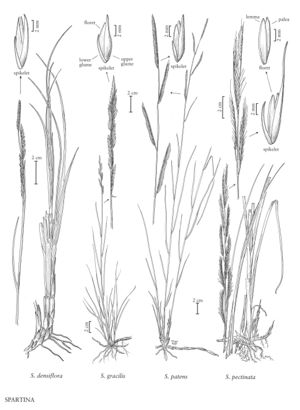Spartina patens
Plants strongly rhizomatous; rhizomes elongate, 1-6 mm thick, whitish, scales not imbricate. Culms 15-150 cm tall, 1-6 mm thick, usually solitary, indurate. Sheaths glabrous or mostly glabrous, throats occasionally short-pilose; ligules about 0.5(1) mm; blades 10—50 cm long, 0.5-4(7) mm wide, involute when fresh, abaxial surfaces glabrous, adaxial surfaces scabrous, margins strongly scabrous; blade of the second leaf below the panicles 4-40 cm long, 0.5-3(7) mm wide. Panicles 3-15 cm, not smooth in outline even if the branches appressed, with 2-15 branches; branches 1-7 cm, alternate, differing only slightly in length and spacing within a panicle, appressed to strongly divergent, with 10-30 spikelets. Spikelets 7-12 mm, linear lanceolate to ovate lanceolate. Glumes glabrous or sparsely hispidulous on the sides, keels scabrous to hispidulous, trichomes (1)1.5-2.5 mm, apices acuminate; lower glumes 3-8 mm, linear; upper glumes 7-12 mm, with 2 lateral veins, these on the same side of the keel, usually hispid, apices acuminate, acute, or obtuse; lemmas mostly glabrous or sparsely hispidulous, keels hispid distally, apices obtuse, rounded, or obscurely lobed; anthers 3-5 mm, well-filled, indehiscent. 2n = 28, 35, 42, 56.
Distribution
Conn., N.J., N.Y., Wash., Va., Del., B.C., N.B., Nfld. and Labr. (Labr.), N.S., Ont., P.E.I., Que., Fla., N.H., Tex., La., N.C., S.C., Pa., Puerto Rico, Virgin Islands, Calif., Ala., Ga., Maine, Md., Mass., Mich., R.I., Miss., Oreg.
Discussion
Spartina patens grows in coastal salt and brackish waters. It is native to the east coast of North and Central America, extending through the Caribbean Islands to the north coast of South America, but is now established at scattered locations on the west coast of Canada and the United States. On the east coast, it is usually one of the dominant components of coastal salt marshes, frequently extending from the dry, sandy beach above the intertidal zone well up into the drier portions of the marshes. The older inland collections are from areas associated with brine deposits or saline soils, but there is some indication that the species' range is increasing inland because of the use of salt to de-ice roads in winter.
The inflorescence of Spartina patens is similar to that of S. bakeri when young, but its inflorescence branches usually diverge at maturity, whereas those of 5. bakeri remain appressed.
Spartina patens is probably one of the parents of S. xcaespitosa, S. pectinata being the other. Unlike S. xcaespitosa, S. patens grows in both disturbed and undisturbed habitats.
Selected References
None.
